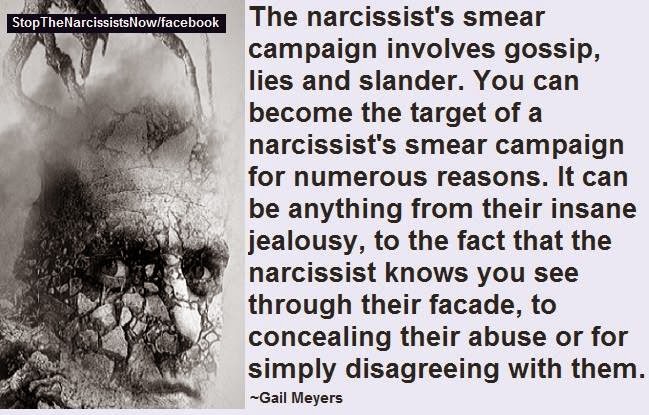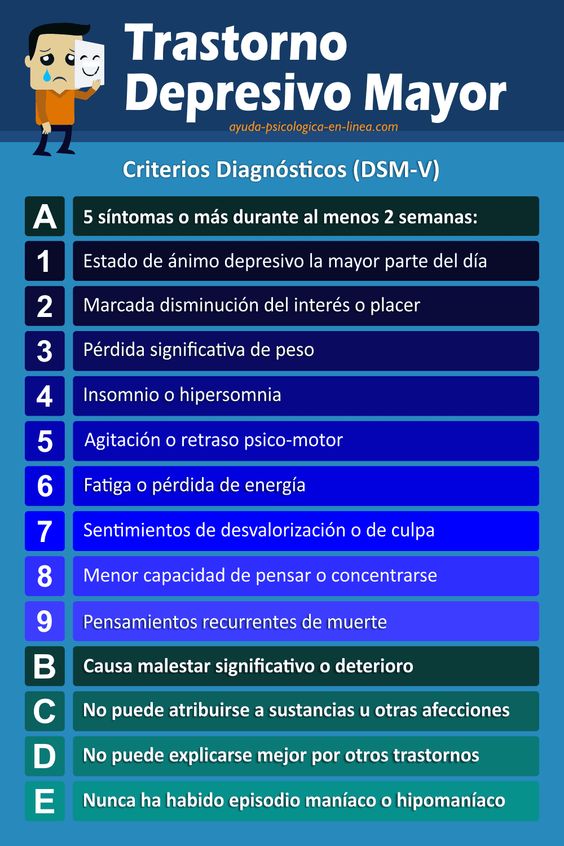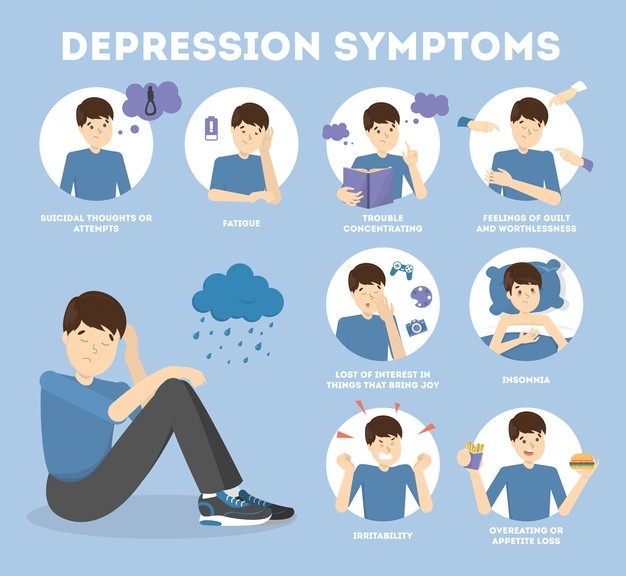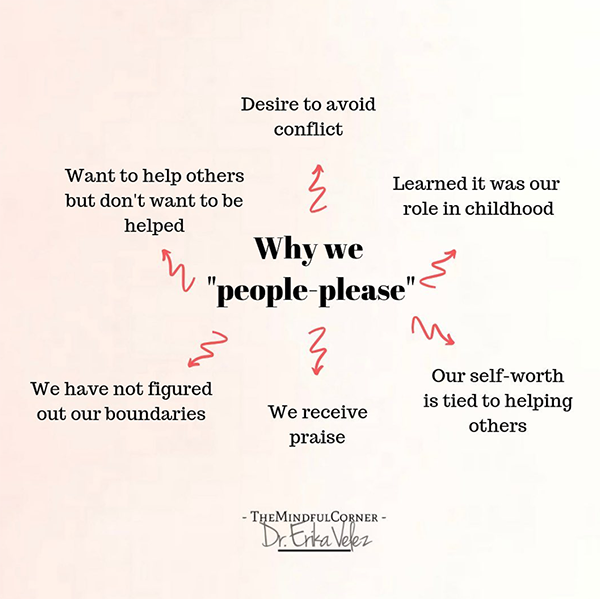Sociopaths and narcissists
The Difference Between a Narcissist and a Sociopath
Source: Yuriy Zhuravov/Shutterstock
You may wonder whether someone is a narcissist or a sociopath and, if it's your partner, whether or not the relationship will improve. Information can empower you. People loosely call others narcissists, but there are nine criteria, five of which are necessary to diagnose someone with a Narcissistic Personality Disorder (NPD). The following summary diagnosis is controversial:
Narcissistic Personality Disorder (NPD)
Narcissism exists on a continuum, but someone with NPD is grandiose (sometimes only in fantasy), lacks empathy, and needs admiration from others, demonstrated by five of the following traits:
- Has a grandiose sense of self-importance and exaggerates achievements and talents
- Dreams of unlimited power, success, brilliance, beauty, or ideal love
- Lacks empathy for the feelings and needs of others
- Requires excessive admiration
- Believes he or she is special and unique and can be understood only by, or should associate only with, other special or high-status people (or institutions)
- Unreasonably expects special, favorable treatment or compliance with his or her wishes
- Exploits and takes advantage of others to achieve personal ends
- Envies others or believes they’re envious of him or her
- Has “an attitude” of arrogance or acts that way
There are several types of narcissists—ranging from the common “Exhibitionist Narcissists” to “Inhibited Narcissists,” or closet narcissists. There are narcissists who aren’t vindictive and abusive. However, narcissists who exhibit all or most of the above characteristics intensely and/or frequently are considered malignant narcissists. Narcissists who have fewer and less severe symptoms, along with “narcissistic” people who don’t have full-blown NPD, can have insight, guilt, remorse, and an ability to connect emotionally, as well as to love. (See "Dealing With a Narcissist: 8 Steps to Raise Self-Esteem and Set Limits with Difficult People" to determine if your loved one is capable of change and whether your relationship can improve.)
Antisocial Personality Disorder
The labels sociopath and psychopath have often been used interchangeably. The clinical term is “Antisocial Personality Disorder” (APD). Like NPD, it’s long-lasting and affects all situations. Sometimes permanent, personality disorders are difficult to treat. Someone with APD must have had a conduct disorder by 15 years old and show at least four of these traits:
- Doesn’t sustain consistent work (or schoolwork)
- Doesn’t conform to social norms, including unlawful behavior, whether or not arrested
- Disregards the truth as indicated by repeated lying, conning, using aliases, not paying debts
- Impulsive or fails to plan ahead; moves around without a goal
- Irritable and aggressive: e.
 g., fights or assaults
g., fights or assaults - Recklessly disregards the safety of self or others
- Consistently irresponsible, as indicated by repeated failure to sustain consistent work behavior or honor financial obligations
- Lacks remorse and feels justified in having hurt, mistreated, or stolen from another
- Doesn’t sustain monogamy for more than one year
Narcissists vs. Sociopaths
Loving a narcissist is painful. Malignant narcissists are the most malicious and destructive and can look like sociopaths.
Shared traits
They both can be charismatic, intelligent, charming, and successful, as well as unreliable, controlling, selfish, disingenuous, and dishonest. They share exaggerated positive self-images and a sense of entitlement. For example, when they’re abusive, they believe they’re justified and deny responsibility for their behavior. They lack insight. Although they might feign appropriate emotional reactions, this is usually insincere, as they lack empathy and emotional responsiveness.
Distinguishing traits
While sociopaths qualify as narcissists, not all narcissists are sociopaths. What drives them differs. But the main distinction is that sociopaths are more cunning and manipulative because their ego isn’t always at stake. In fact, they don’t have any real personality. They’re the ultimate con artists and can take on any persona that suits them. Thus, they may be harder to spot, because they’re not trying to impress you or win your approval—unless it serves their agenda. Instead of bragging, their conversation might center on you rather than on themselves, and they can even be self-effacing and apologetic if it serves their goal.
A sociopath is more calculating and might premeditate aggression in advance. A narcissist is more likely to react sooner with lies and intimidation. Narcissists often work hard to achieve success, fame, and perfection but may exploit others along the way. In contrast, sociopaths try to swindle, steal, or exploit others financially. Although both characters may be motivated to win at all costs, narcissists are more interested in what you think of them. They need others’ admiration. This makes them dependent and codependent on others and actually capable of being manipulated. They’re less likely to divorce their spouse than a sociopath, who might leave or vanish if they’re exposed or don’t get what they want.
Although both characters may be motivated to win at all costs, narcissists are more interested in what you think of them. They need others’ admiration. This makes them dependent and codependent on others and actually capable of being manipulated. They’re less likely to divorce their spouse than a sociopath, who might leave or vanish if they’re exposed or don’t get what they want.
Help and Treatment
If you’re in an abusive relationship, whether your partner is a narcissist or a sociopath is irrelevant. You cannot change another person, but changing your behavior will change the relationship. You need support to restore the trust in yourself and others that becomes damaged in an abusive relationship. Find help to set boundaries and raise your self-esteem.
Narcissists and sociopaths don’t usually seek treatment, unless, in the case of NPD, they’re experiencing severe stress, depression, or their partner insists. Those with APD are sometimes unwillingly court-ordered to therapy, which presents problems of trust and receptivity.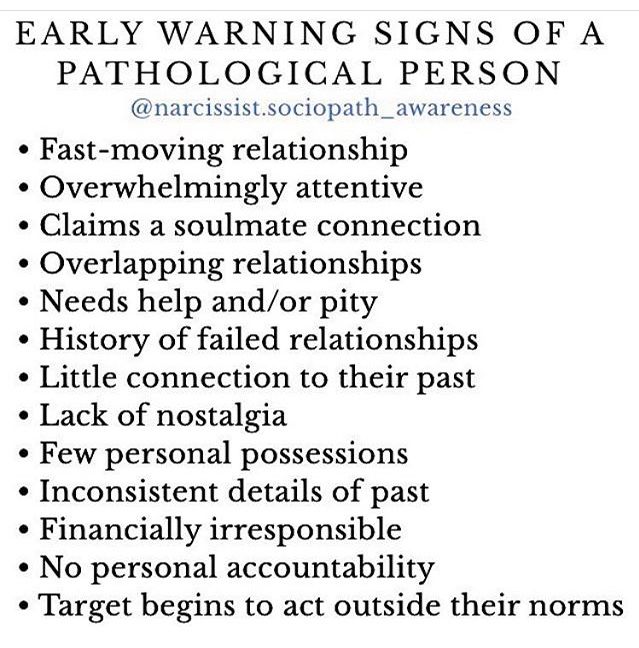 Therapy should focus on helping them access their feelings and learn from the negative consequences of their behavior.
Therapy should focus on helping them access their feelings and learn from the negative consequences of their behavior.
Many narcissists can improve with a specific treatment, and those who have insight can benefit from psychodynamic psychotherapy. If you suspect you’re in a relationship with a narcissist, learn more about narcissistic relationships and get my checklist of narcissistic behaviors.
Everyone is unique, and people don’t always fit neatly into defined categories. Severe NPD resembles APD, and any differences are really irrelevant. If you’re being abused, get help immediately. Don’t be concerned with a diagnosis; instead, heal yourself from trauma or PTSD and codependency. Become assertive and set limits. Whether you’re thinking of staying or leaving the relationship, neither will be easy. Focus on gaining awareness, protecting yourself, and getting help and support. Follow the steps in my book, Dealing With a Narcissist, to raise your self-esteem, set boundaries, and evaluate the prospects for improving your relationship.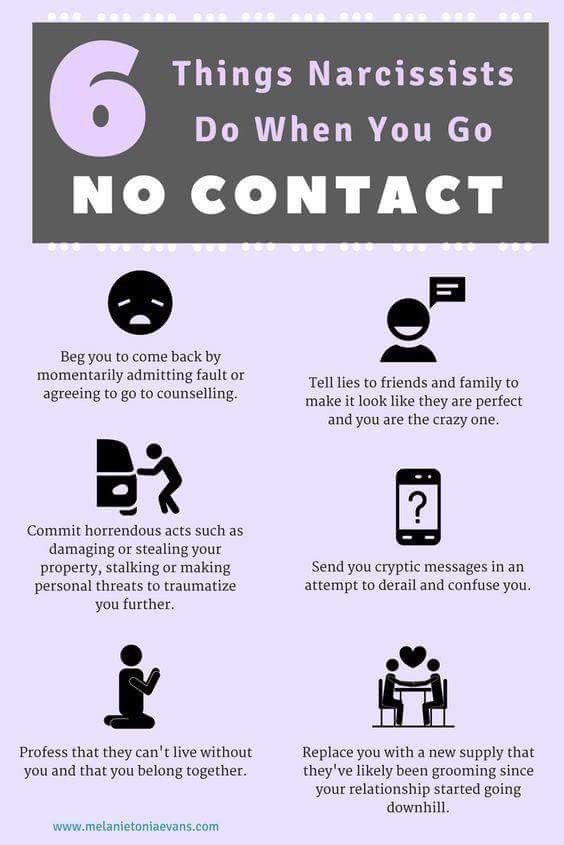 When you argue and fight with an abuser, you lose. But that doesn't mean that you shouldn't confront what is going on. However, you need to do so calmly and strategically. Change and a better life are definitely possible.
When you argue and fight with an abuser, you lose. But that doesn't mean that you shouldn't confront what is going on. However, you need to do so calmly and strategically. Change and a better life are definitely possible.
© Darlene Lancer 2016
Facebook Image Credit: fizkes/Shutterstock
Key Differences Between Sociopaths & Narcissists
Skip to contentPublished: November 17, 2021 Updated: October 11, 2022
Published: 11/17/2021 Updated: 10/11/2022
Sociopathy is a term to describe people who are diagnosed with antisocial personality disorder (APD), but it is sometimes confused with narcissistic personality disorder (NPD). The terms carry very different meanings. People with APD have no regard for laws or others’ rights, and those with NPD have no empathy for others, carry a heightened perspective of themselves and they frequently require praise.1
Would you like to try therapy? BetterHelp has over 20,000 licensed therapists who provide convenient and affordable online therapy. BetterHelp starts at $60 per week. Complete a brief questionnaire and get matched with the right therapist for you.
BetterHelp starts at $60 per week. Complete a brief questionnaire and get matched with the right therapist for you.
Choosing Therapy partners with leading mental health companies and is compensated for referrals by BetterHelp
Visit BetterHelp
What Is Narcissism?
Narcissism is another name for individuals who have traits of Narcissistic Personality Disorder (NPD). NPD is distinguished by a grandiose sense of self and a need to be admired and validated frequently. Narcissists tend to have little empathy for others and do not respond well to criticism, as they are frequently insecure.1,2,3,4
There are lots of different ways narcissism can present itself, including covert narcissism, which is more internalized, and communal narcissism, which tends to come out in group settings.
Signs of a narcissist include:1,2,3,4
- Significantly heightened sense of self that includes exaggerating their achievements
- Frequently requiring admiration and approval
- Preoccupation with fantasies about limitless power and success
- Believing they are unique and can only be connected with similar type people
- Expressing unreasonable expectations of people as well as expecting said people to automatically agree with their wishes
- Lacking the ability to identify or connect with others’ feelings and needs
- Feeling envious of others and believing that others envy them
- Difficulty with mood regulation, especially if they feel criticized
What Is Sociopathy?
Sociopathy is a name given for those who have been diagnosed with Antisocial Personality Disorder (APD). APD is characterized by a continuous disregard and violations of others’ rights, feelings, and the law. Sociopaths are often known to use manipulation along with other forms of antisocial behavior to meet their needs.1,5,6
APD is characterized by a continuous disregard and violations of others’ rights, feelings, and the law. Sociopaths are often known to use manipulation along with other forms of antisocial behavior to meet their needs.1,5,6
Signs of a sociopath include:1,5,6
- Inability to meet social norms, evidenced by continuously engaging in illegal behaviors, whether or not they are arrested
- Using manipulation and lying to meet personal needs and wants
- Lack of remorse for their behaviors and any impact they have caused
- Displaying failure to plan for the future and impulsive behaviors
- Irritable mood
- Verbal or physical aggression, including assault
- Reckless behavior and disregard for other people’s safety
- Continuous irresponsibility and inconsistency in daily expectations, such as instability in work, relationships, or financial responsibilities
Key Differences Between a Narcissist & a Sociopath
While narcissists and sociopaths may appear to have some similar traits based on the signs listed above, they have a number of distinct differences, including their motivation and how and why they treat others the way they do.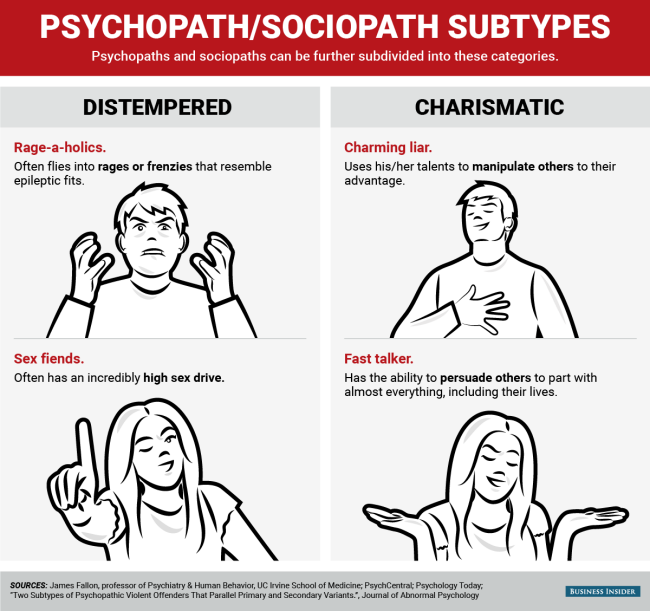
Here are some key differences between a narcissist and a sociopath:
Motivation
The main difference between narcissists and sociopaths includes the motivation for their behaviors. Narcissists have a larger-than-life self-perspective and often present this exaggerated, brilliant version of themselves to others in general. However, their behaviors—such as praising themselves or exaggerating their talent—are often motivated by the intent to have others admire them and recognize their achievements and their “special,” status, which is often to fulfill a deeply neglected ego.1,3,4
Sociopaths, on the other hand, tend to have motivation that is based on what interests them and their specific goals, and do not require any personality or ego fulfillment. They are only interested in accessing something of their own interest and tend to engage in whatever action is necessary—regardless of how they harm anyone or anything else—to meet their goals. 1,5,6 This can be fueled by how they treat or perceive others.
1,5,6 This can be fueled by how they treat or perceive others.
How They View Others
In the perspective of a narcissist, the expectation of others to praise and admire the persona they present to the world is influenced by a need to be seen as “special,” and to fulfill their ego. In this goal, they will often see others as below their own status, regardless of the input they have to offer. As a result, narcissists can come off as shallow, cut-throat, and self-centered while trying to achieve an ego that is required to be bolstered by others’ admiration and “VIP” treatment.
Sociopaths do not require this admiration to meet their goals. Sociopaths often treat people as expendable, but also have the ability to be incredibly manipulative and charming. Although sociopaths do not need an ego boost, they will manipulate, flatter, and charm other people to help them achieve their goals, and then walk away without looking back. In addition, sociopaths lack any remorse in getting anyone or anything else harmed, regardless of whether it harms their reputation. These goals can be important, as both narcissists and sociopaths have significant differences in the ability to maintain work and structured goals.1,2
These goals can be important, as both narcissists and sociopaths have significant differences in the ability to maintain work and structured goals.1,2
Need for Reputation
Narcissists struggle with an ego that often needs support to maintain its “special” status, which the narcissist wholly believes is an accurate representation of themself. To do so, narcissists can be found to work hard to maintain their successful, “VIP” status, and have the ability to maintain work, even though they may hurt people on the way to this perceived success.
Sociopaths will break laws and norms without any care to meet their goals and interests. As a result, sociopaths tend to have difficulties maintaining work and may be frequently involved with the legal system.1,2,7
Regardless of narcissists’ and sociopaths’ abilities to flatter and manipulate, one may be able to observe the differences in their ability to maintain relationships, work or careers, social, or financial expectations.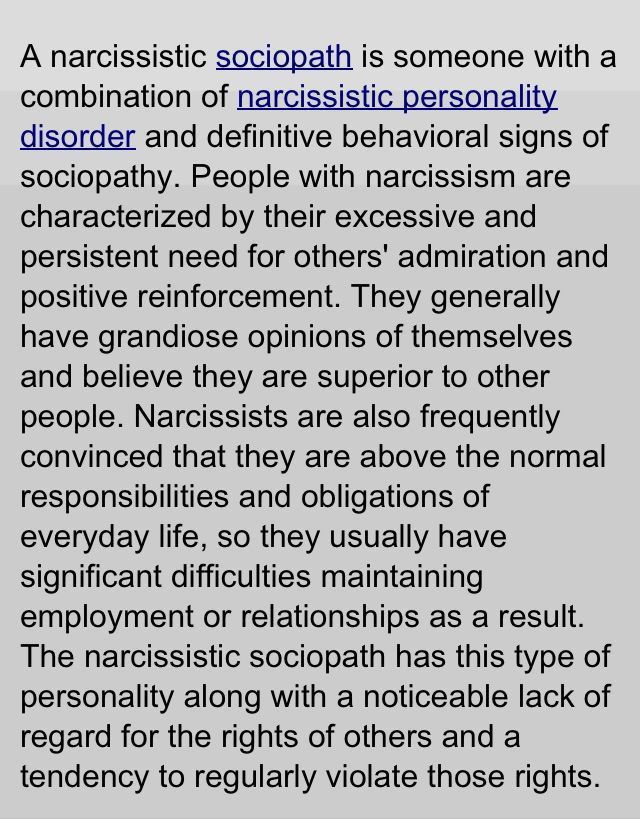 1
1
Sociopaths can be easily confused as a narcissist because they do share some similarities, but there are significant differences in the way they treat people.
Similarities Between Narcissists & Sociopaths
While they may have different motivations, both narcissists and sociopaths share the ability to be charming, successful, and alluring. Each also has the capability to be cut-throat, selfish, controlling, and engage in lying and dishonest behavior towards people to meet their goals.1
Further, both sociopaths and narcissists can show others successful personas and exaggerate their skills and achievements. Those with APD and NPD both have difficulty acknowledging insight to their behavior and thinking.1
What Is a Narcissistic Sociopath?
A narcissistic sociopath, also called a malignant narcissist, is someone who has a combination of narcissistic and sociopathic traits, but may not qualify for either diagnosis due to not meeting the expected amount of symptoms for either disorder. While this is not a diagnosis commonly used at this time, this does not mean that someone who has these traits is less dangerous than a narcissist or a sociopath.
While this is not a diagnosis commonly used at this time, this does not mean that someone who has these traits is less dangerous than a narcissist or a sociopath.
A narcissistic sociopath shares these traits with narcissists:
- Grandiosity
- Fantasies of unlimited successes or power
- The self-perspective of being “unique”
- a need for admiration,
- an expectation of deserving and entitlement,
- exploiting people for personal gain,
- envy for others,
- lacking empathy or concern for others, and
- struggle with a fragile ego and difficulty with criticism.
They also share these traits with sociopaths:
- Lacking empathy
- Exploiting others for interests
- Lacking interest in others unless able to use them for gain
A narcissistic sociopath does differ in that they can struggle with constant feelings of self-doubt, paranoia about outside influences, and emptiness. They can connect with some social groups, but this can be limited to the people who support them regardless of their negative behaviors. 8
8
Help For Narcissistic Abuse
Individual Therapy – Get personalized help with recovering from narcissistic abuse from a licensed therapist. BetterHelp offers online sessions by video or text. Try BetterHelp
Support Groups – You are not alone in dealing with a narcissist. Sesh offers over 100 different support groups per month, with at least once a week focused on narcissism. First Month Free
Books On Narcissism – See our handpicked selection of Narcissism Books List
Choosing Therapy partners with leading mental health companies and is compensated for referrals by BetterHelp and Sesh.
Tips for Dealing With Narcissists & Sociopaths
Dealing with a narcissist or a sociopath can be difficult and overwhelming, especially if you have not dealt with behavior like this before. Due to the tendency of narcissists and sociopaths to lack insight about their behavior, it is important to note that these individuals rarely attend or engage in mental health treatment.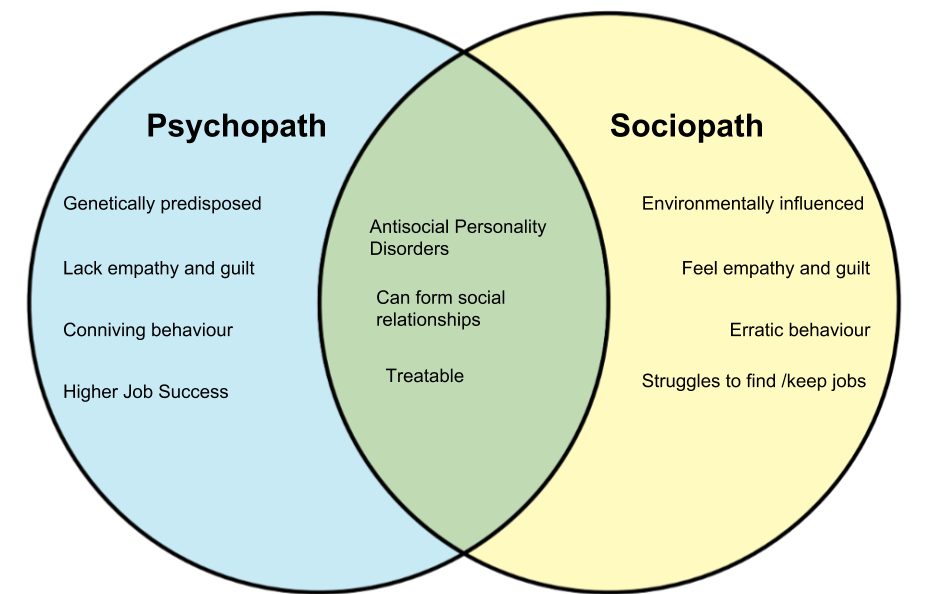
If a narcissist or sociopath engages in treatment, it is more common that it is for substance use and rather than their other problematic behaviors. Narcissists and sociopaths have behavior traits that can lead to financial, emotional, or physical abuse of those who are close with them, regardless of the relationship, and it can be difficult to make sense of their behaviors or seek help for yourself.
Some tips for dealing with a narcissist or a sociopath include:5,6,7
- Set and maintain firm boundaries. When you bend a boundary, a narcissist or a sociopath is likely to take advantage of that wiggle room.
- Respond without emotional reaction when addressing the issue at hand. If the request seems unrealistic, you could ask if the request is reasonable, with facts to back up your perspective.
- Gently address an issue, especially with narcissists who can have difficulty with criticism, and demand changes in behaviors rather than promises (and you can remind them how everyone is looking forward to this change).
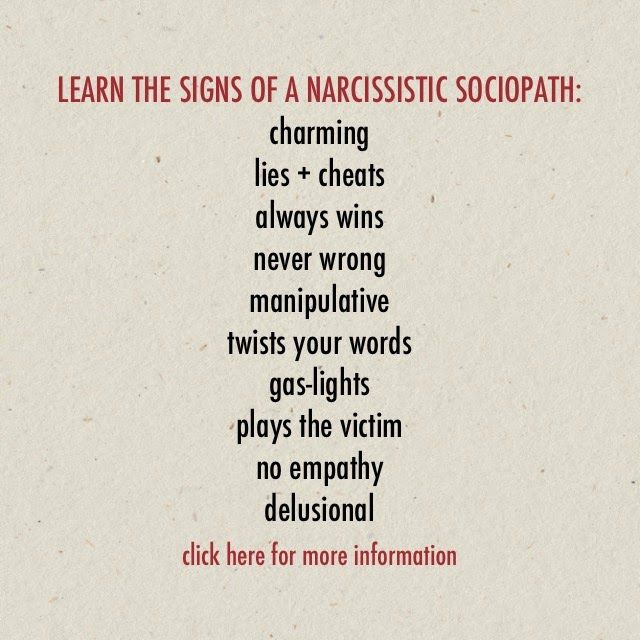
- Allow yourself space and attention to work on your goals and needs, and do not get sucked into the narcissist’s or the sociopath’s world.
- Monitor your safety risk and know if it is time to go (especially if you’re dating a sociopath or a narcissist). Make a safety plan with your support system or an agency, if needed.
Final Thoughts
Both of these diagnoses are serious personality disorders and can be difficult to live or deal with on a regular basis, especially if you are already feeling stressed. However, you are not alone and there are ways to find the light or a path that works for you.
Additional Resources
Education is just the first step on our path to improved mental health and emotional wellness. To help our readers take the next step in their journey, Choosing Therapy has partnered with leaders in mental health and wellness. Choosing Therapy may be compensated for referrals by the companies mentioned below.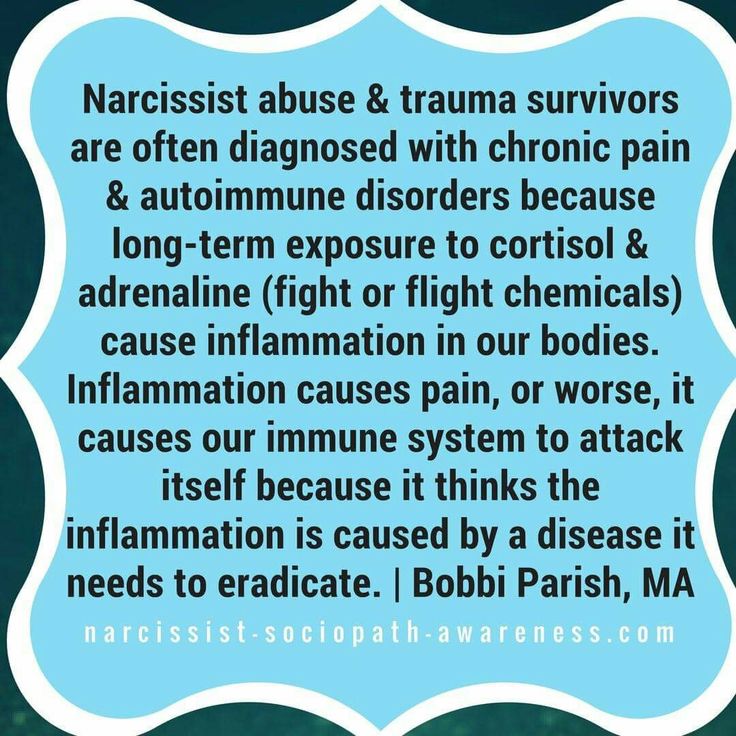
BetterHelp (Online Therapy) – BetterHelp has over 20,000 licensed therapists who provide convenient and affordable online therapy. BetterHelp starts at $60 per week. Complete a brief questionnaire and get matched with the right therapist for you. Get Started
Online-Therapy.com – The Online-Therapy.com standard plan includes a weekly 45 minute video session, unlimited text messaging between sessions, and self-guided activities like journaling. Recently, they added Yoga videos. Get Started
Mindfulness.com (App) – Mindfulness and meditation can change your life. In a few minutes a day with Mindfulness.com, you can start developing mindfulness and meditation skills. Free Trial
Choosing Therapy’s Directory – Find an experienced therapist who is committed to your wellbeing. You can search for a therapist by specialty, availability, insurance, and affordability. Therapist profiles and introductory videos provide insight into the therapist’s personality so you find the right fit. Find a therapist today.
Find a therapist today.
Choosing Therapy partners with leading mental health companies and is compensated for referrals by BetterHelp, Online-Therapy.com, and Mindfulness.com
For Further Reading
- Best Books About Narcissism
- NarcissistAbuseSupport.com
- LoveFraud.com: Recovery From a Sociopath
8 sources
Choosing Therapy strives to provide our readers with mental health content that is accurate and actionable. We have high standards for what can be cited within our articles. Acceptable sources include government agencies, universities and colleges, scholarly journals, industry and professional associations, and other high-integrity sources of mental health journalism. Learn more by reviewing our full editorial policy.
-
American Psychiatric Association. (2013). Diagnostic and Statistical Manual of Mental Disorders, 5th Edition: DSM-5 (5th ed.). American Psychiatric Publishing.

-
Russ, E., Shedler, J., Bradley, R., & Westen, D. (2008). Refining the Construct of Narcissistic Personality Disorder: Diagnostic Criteria and Subtypes. American Journal of Psychiatry, 165(11), 1473–1481. https://doi.org/10.1176/appi.ajp.2008.07030376
-
Taylor Counseling Group. (2021, April 2). How to Deal With a Narcissistic Family Member. Retrieved October 10, 2021, from https://taylorcounselinggroup.com/blog/how-to-deal-with-a-narcissistic-family-member/
-
Cleveland Clinic. (2020, June 19). Narcissistic Personality Disorder: Traits, Tests, Treatment. Retrieved October 11, 2021, from https://my.clevelandclinic.org/health/diseases/9742-narcissistic-personality-disorder
-
Stines, S. P. (2019, October 11). Coping with Sociopaths (Antisocial Personality Disorder). Psych Central. Retrieved October 11, 2021, from https://psychcentral.
 com/pro/recovery-expert/2019/10/coping-with-sociopaths-antisocial-personality-disorder
com/pro/recovery-expert/2019/10/coping-with-sociopaths-antisocial-personality-disorder -
Galperin, S. (2021, May 17). Are you Dealing with a Sociopath? CBT Psychology. Retrieved October 10, 2021, from https://cbtpsychology.com/dealing-sociopath/
-
N. Thomas. (2021, November 3). 13 Tips for How to Deal With a Narcissist. Choosing Therapy. Retrieved October 13, 2021, from https://www.choosingtherapy.com/deal-with-narcissist/
-
Goldner-Vukov, M., & Moore, L. J. (2010). Malignant narcissism: From fairy tales to harsh reality. Psychiatria Danubina, 22(3), 392–405.
If you are in need of immediate medical help:
Medical
Emergency
911
Suicide Hotline
800-273-8255
Narcissists and Psychopaths
First and foremost, every psychopath has narcissistic traits, but not every narcissist is a psychopath.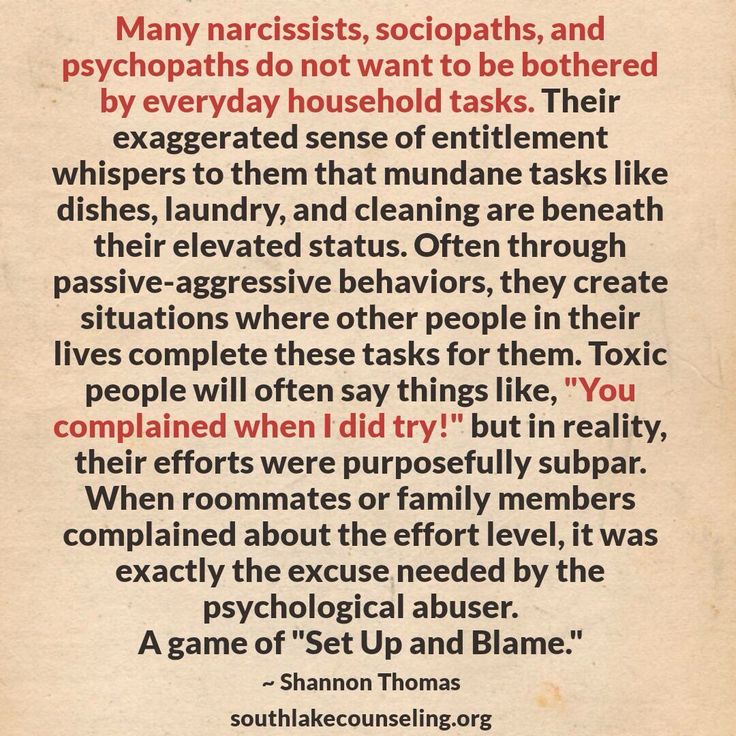 Many have narcissistic traits, but those diagnosed with narcissistic personality disorder are characterized by a lack of empathy and a sense of their own grandiosity. And such people urgently need admiration from others.
Many have narcissistic traits, but those diagnosed with narcissistic personality disorder are characterized by a lack of empathy and a sense of their own grandiosity. And such people urgently need admiration from others.
Self-esteem of narcissists is lame: deep down they feel vulnerable, and therefore it is so important for them that the people around them were also insecure. Pulling the rest off the pedestal and rising against their background is their defensive tactic. When narcissists do something really bad, they wake up with faint echoes of shame and guilt, while the source of their shame is the opinion of others about them, the possibility of condemnation on their part.
And this is their serious difference from psychopaths - they do not happen to experience remorse. They don't care if anyone gets hurt, they don't care about the consequences of their own actions.
In addition, these people completely lack the ability to empathize, but they brilliantly manipulate others (and often seem very charming at the same time), use them to their advantage.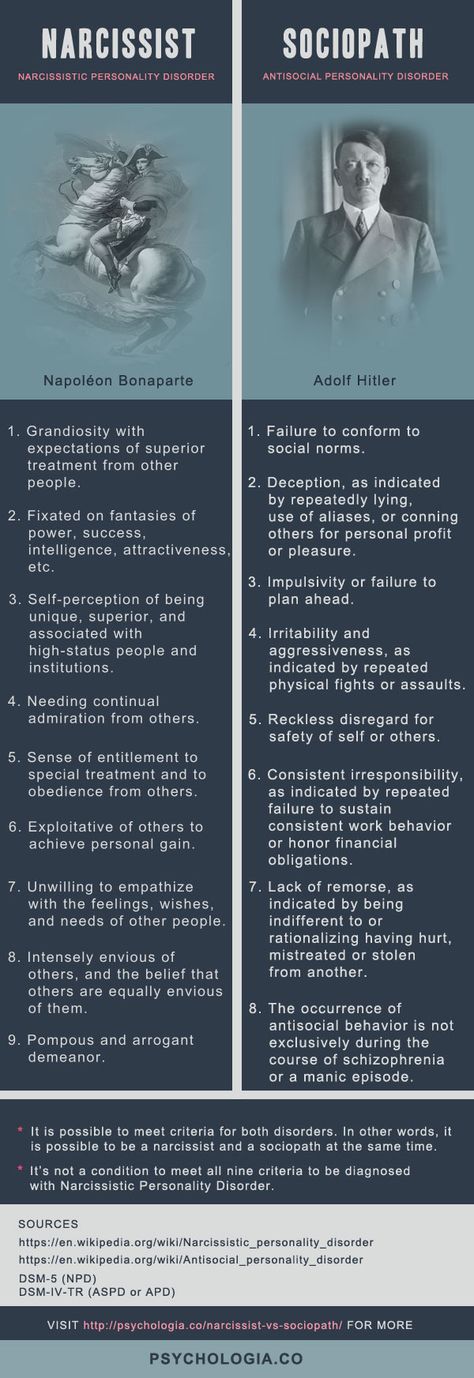 Cunning is their middle name.
Cunning is their middle name.
Psychopaths and sociopaths
Psychopaths and sociopaths have much in common - both are diagnosed with antisocial personality disorder. The key difference is that psychopaths are born, but sociopaths are made. The latter are at risk of becoming children from dysfunctional families and those who grew up in a criminogenic environment. They may not be as comfortable breaking the law and going against the rules as psychopaths, but they have lived in such an environment for too long and have begun to take these rules of the game for granted.
A psychopath builds a relationship by using the other solely for his own purposes - financial, sexual or any other. A sociopath, on the other hand, can form quite close ties, however, even in such relationships, he will behave coldly and aloofly. Sociopaths are more impulsive, it is easier to provoke a lively reaction in them.
Psychopaths are more cold-blooded and prudent, their nervous system generally reacts to stimuli differently than ours: for example, when we are frightened, our heart begins to beat furiously, the pupils dilate, sweat flows in a stream; we are preparing for a fight-or-flight response. You won't even notice that a psychopath is scared. His brain functions differently, and it is still unknown what is more influenced here - genetics or environment.
You won't even notice that a psychopath is scared. His brain functions differently, and it is still unknown what is more influenced here - genetics or environment.
Most of us tend to avoid things that make us nervous. Psychopaths don't get nervous at all and so they just keep doing what they want. By the way, it is likely that the desire to feel at least something, at least some echo of the arousal characteristic of other people, makes them try their hand at dangerous activities - including extreme sports and activities on the verge of the criminal code and common sense. meaning.
Why is it important for us to understand the difference between narcissists, psychopaths and sociopaths? First of all, in order not to treat everyone with the same brush, not to stick the same labels on different people. But, perhaps, it is much more important to learn to notice the signs described above in the people around you - firstly, in order to gently push them to seek professional help, and secondly, in order to be vigilant yourself and not suffer.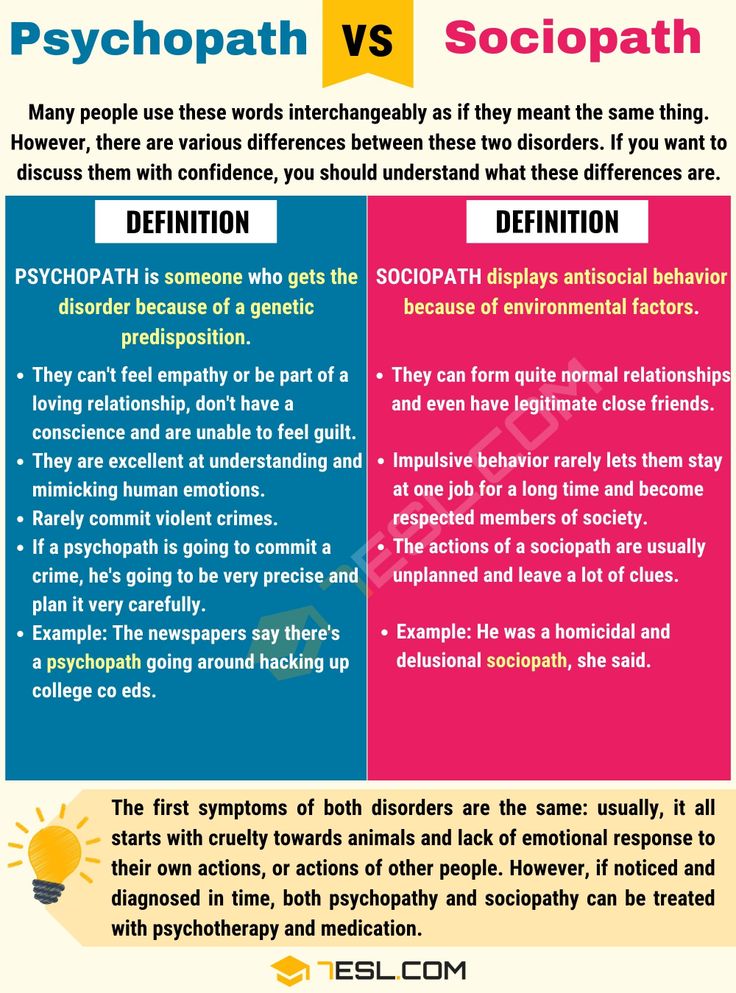
Narcissists and sociopaths: 5 tactics by which such people take away your strength
Friday, November 4, 2022
Vasily Khmelnitsky Foundation
Opinions
Shutterstock
Psychology
And why these disorders are common in corporate culture
Are you constantly feeling unwell and tired in the evening so that you fall into bed with your clothes on? Do you take sedatives before you go to work? Do you wince every time you receive a message in the messenger? It seems that you are out of luck - you most likely have a destructive personality in your office.
Narcissism and sociopathy are disorders whose symptoms almost coincide with the qualities that are welcomed and encouraged in modern corporate culture companies. A PricewaterhouseCooper study, Economic Crimes: People, Culture and Control, confirmed psychologists' hunch that psychopathy is rampant among corporate executives, says Carrie Danes, author of The Devil You Know.
The author of another book, Confessions of a Sociopath, M. Thomas is a successful lawyer in one of the largest American law firms and a diagnosed sociopath.
Shutterstock“We are legion,” writes Thomas. – The key symptoms are “persistent behavior characterized by disregard for and violation of the rights of others.”
This is a very accurate description of narcissists and sociopaths, who are also called destructive personalities and toxic people. The main way to communicate with others for them is manipulation and lies.
Here are five favorite tactics for manipulating destructive people.
Rage
It is very easy to drive a narcissist into a frenzy - just disagree with him. It doesn't matter that he claims the sky is green. He corrected a toxic person, and even with a team - he received a fit of narcissistic rage in response. According to psychiatrist and author of How to Talk to Assholes, Mark Goulston, narcissistic rage is not the result of low self-esteem, but a belief in one's own infallibility and a false and overblown sense of superiority over others. Also, destructive personalities use sudden outbursts of anger as a tool of intimidation - loud screams and objects flying around the office silence the victims and do everything to appease the aggressor and stop the conflict. To defend yourself, it is enough to maintain at least a semblance of calmness - not to shout back, speak in a calm voice, if possible, stop communicating, promising to return to the issue later.
Also, destructive personalities use sudden outbursts of anger as a tool of intimidation - loud screams and objects flying around the office silence the victims and do everything to appease the aggressor and stop the conflict. To defend yourself, it is enough to maintain at least a semblance of calmness - not to shout back, speak in a calm voice, if possible, stop communicating, promising to return to the issue later.
Driven to insanity
One of the narcissist's favorite ways to subdue others is gaslighting, intentional misrepresentation and distortion of meaning. This manipulative technique is easy to calculate by the phrases “You thought of everything”, “It seemed to you”, “There was no such thing” and “Are you all crazy?”. This is how a toxic person reacts to reproach, criticism, or if he falls for a lie (and narcissists and sociopaths almost always lie).
Deliberately distorting the facts and accusing, a destructive person confuses the interlocutor
The manipulator is trying to convince you that you are inadequate. Don't get fooled. To resist the aggressor, write down what is happening to you, tell your friends about it, find those who will sympathize with you and be able to assess the situation from the outside. Play it safe by saving emails from a destructive colleague and taking screenshots of all your correspondence.
Don't get fooled. To resist the aggressor, write down what is happening to you, tell your friends about it, find those who will sympathize with you and be able to assess the situation from the outside. Play it safe by saving emails from a destructive colleague and taking screenshots of all your correspondence.
From a sick head to a healthy one
Narcissists very often use projection in communication - attributing their own qualities to others. Clinical specialist in narcissistic disorder Linda Martinez-Levi says that in narcissists, projections often become a form of psychological abuse. For example, your manipulative colleague often clashes with other people. If you dare to criticize him for this, he will immediately accuse you of conflict. In this way, the narcissist displaces responsibility for his negative traits by simply attributing them to other people. According to the famous psychologist and writer Kim Said, toxic people do such things sometimes just out of boredom - they have fun, at the same time probing your weaknesses. Therefore, in order not to succumb to this manipulation, keep in mind that you are in order - this is your colleague who clearly needs help. Don't let your self-esteem be trampled into the mud.
Therefore, in order not to succumb to this manipulation, keep in mind that you are in order - this is your colleague who clearly needs help. Don't let your self-esteem be trampled into the mud.
Condescending tone
Narcissists are absolutely sure that they understand everything much better than everyone else. Although this confidence is most often not substantiated. Which does not prevent the manipulator from talking with colleagues, subordinates and even superiors in a condescending tone - constantly teaching, giving advice and forcing people to redo everything ten times. Nagging, generalizations and allegations are also used, since the main thing for a narcissist is self-affirmation, and not the result of work. If you are being treated like a child, in no case do not tolerate it - tell the manipulator directly that you will not allow anyone to talk to you in a similar tone.
Change of priorities
The favorite game of sociopaths and narcissists is to confuse everyone around, bring the situation to the point of absurdity, and then enjoy watching the distorted faces of others. To do this, manipulators often change their minds, priorities, and even sympathies. Carrie Danes in the book “The Devil You Know” describes a common situation - a colleague with whom you almost walked arm in arm for a month and drank coffee at lunch, tomorrow stops noticing you or is rude and spins fables about you to your superiors. This is the typical behavior of a narcissist and a sociopath. Their sympathy for other people is always fleeting and superficial, which is why they change "friends" and favorites so often.
To do this, manipulators often change their minds, priorities, and even sympathies. Carrie Danes in the book “The Devil You Know” describes a common situation - a colleague with whom you almost walked arm in arm for a month and drank coffee at lunch, tomorrow stops noticing you or is rude and spins fables about you to your superiors. This is the typical behavior of a narcissist and a sociopath. Their sympathy for other people is always fleeting and superficial, which is why they change "friends" and favorites so often.
Just as often, destructive personalities change the rules of the game in communication
If yesterday such a person encouraged calmness and a measured pace of work, then tomorrow he will yell at you because you work too slowly and do not rush into battle, biting the bit. The ideal way to counter this technique is to keep communication with such a person to a minimum. Carrie Danes also recommends informing the bosses of the manipulator and the personnel department.